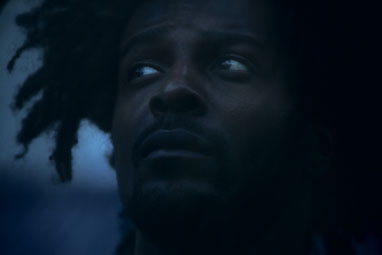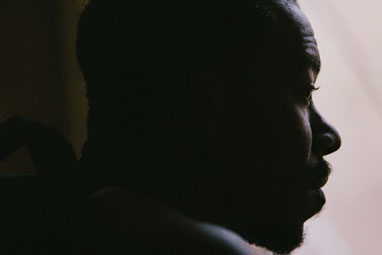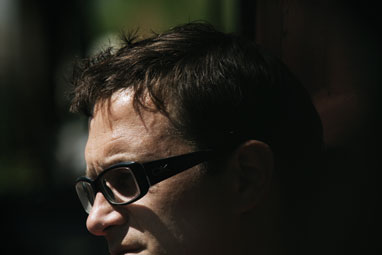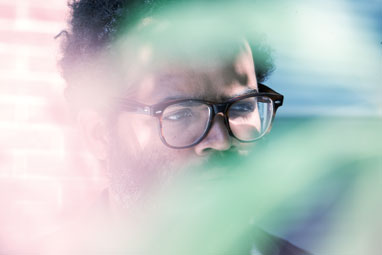When we decided to put Brooklyn's TV on the Radio on the front cover of our Photo Issue we were living in a state of uncertainty: We didn't know who our next president was going to be, the economy was on the verge of catastrophe, and a bunch of scientists were about to turn on a machine that could potentially have sucked our entire planet into a black hole. Our country may still have a long way to go, but we have a new president, are excited about life (in spite of America's rock bottom financial situation), and the Hadron Collider ended up doing a bunch of harmless stuff that scientists thought was really cool. After the jump read Edwin Houghton's feature on TV on the Radio, in which they address many of their existential concerns, accompanied by an epic set of closeup photos by Jason Nocito.
“You ever play that game of, like, Which of these screws is really important?” says Dave Sitek. His sarcastic voice is flat and disembodied, muffled by the huge mixing console he’s managed to wedge himself behind. The board belongs to a cramped studio in Williamsburg, Brooklyn, where I sit around a battered couch and cluttered coffee table with the four other members of TV on the Radio: singer Tunde Adebimpe, drummer Jaleel Bunton, guitarist Kyp Malone and bassist Gerard Smith. As Sitek proceeds to take the board apart with a screwdriver, conversation on the couch hovers lazily around the activity of the night before. Malone speculates on whether it can be called “cruising” if you’re not doing it at a gay bar. Adebimpe comments on how fuzzy and not-present he feels when he’s not getting fucked up regularly. “It’s funny how getting smashed every night puts your schedule in hard order. Like, My head is killing me…must be Tuesday,” he says. About that time the board goes back together and after sending a quick and very loud blast of sound through the speakers to test it, Sitek joins the rest of the crew to discuss their new album Dear Science. As he pulls up a chair to complete the circle, he holds up the screw in question and says, “I bet this one wasn’t really doing anything important.”
Since their 2003 debut EP Young Liars, TV on the Radio have become the poster boys of a certain Brooklyn—a very different place from Jay-Z’s Marcy or Biggie’s Bed-Stuy, even though geographically it almost overlaps them. Not that they could really stand for any one scene, per se—the essence of their sound is too non-conformist. But in a sense non-conformity is the Brooklyn they represent, a free zone where you expect your neighbors to make noise or art or at the very least debauchery until the smallest, most microscopic hours of the night and they expect exactly the same of you.
If you believed the glowing press that their last album Return To Cookie Mountain received, TVOTR’s genius lies in their ability to find beauty within the sounds of alienation and urban dysfunction. But if you’ve ever encountered the beast in its natural habitat, it’s pretty clear that they have been as misunderstood as they have been deservedly celebrated. As Bunton says, “We all moved here from somewhere a little more alienating to be a little less alienated.” Likewise, their music feels more like an antidote for soullessness than a comment on it. It’s a junkyard utopia collaged together out of any brokedown thing that happens to be close at hand: overheard phrases, discarded drum machines, skipping CD players. Their music could never be called light—nobody is clamoring to place their post-Katrina heartbreak “Dry Drunk Emperor” in a car commercial—but even when examining the darkest corners of their own internal spaces, the band has always treated their neuroses and apocalyptic fears with the same sense of play as they have their recording equipment, more grist for the ugly beauty of improvisation.

Dear Science, however, is something else again. I hear it for the first time on a CD glued permanently into a portable CD player, sitting on a leather sofa in the anonymous midtown offices of Interscope Records. The Discman eternally welded to one disc seems so non-functional it’s almost an art object. Then again, I never try to open it and steal the CD, so maybe it isn’t glued at all. Maybe the prohibition on bootlegging and the ridiculous sculptural quality of the device both exist only in my imagination. As I listen, a plane glides between two gleaming skyscrapers like a flying car out of Metropolis, inching across a beautiful patch of August afternoon sky. Reclining on the seductive dark leather, listening to the big harmonies and disco rhythms, I can’t help but thinking, Now this is what alienation sounds like.
For one thing, Dear Science’s freak flag seems to be at half-mast. The album’s beautiful dirges are a logical extension of the band’s recent movements, but something definitely has changed. The surprising stutters and textures of TVOTR’s past are subsumed within a more subtle orchestration. The fuck-shit-up joy has been replaced with melodies that are either ominous or uplifting in a more serious way. And then there’s the disco element. Converse to the usual logic of rock LPs, the danceable parts of Dear Science, like “Dancing Choose” and “Golden Age,” seem to be the emotional heart of the album, not its throwaway singles. “Red Dress” in particular feels like a blueprint for a new TVOTR. With its blaring sax and Nile Rodgers guitars, it comes on like pure funk until you absorb the lyrics: Your plow shear/ It’s a sword/ And its wide arcing swing / Chops the heads off of many things / Go ahead put your red dress on/ Days of white robes have come and gone/ Oh you rivers, oh you waters run/ Come bear witness to the Whore of Babylon! Then you realize that disco is maybe the darkest thing the band has ever done.

Back on the couch, Malone says, “Definitely on the Young Liars EP and Desperate Youth [Blood Thirsty Babes] my part was—not necessarily experimentation—but not knowing what the fuck we’re supposed to do and figuring it out. Cookie Mountain was lots of really broad brush strokes. We just got a lot more specific on this record. It was less of the accidental beauty of going for it—having things stick together and collide—and more thought out.” The band’s writing process is still something of a swap meet, or as Adebimpe describes it, “We’re always working on our own different stuff, so then everyone just kinda brings everything in and it’s like, We’ll take that one and that one and you keep fatty.” But the confidence earned with Cookie Mountain translated into a newfound minimalism on the Science sessions. “There were times when there were two pieces of gear on for everything,” explains Sitek. “We went for days without recording anything on more than two tracks. There was no, We have to make this giant cavernous sound. It was about only having the cavern when a song in a specific part needed it, and then shut it the fuck up.”

But there is far more to the shift that Science embodies than just studio mastery; it mirrors a major change in where the band’s head is at. “Maybe it reflects being on tour, being a nomad, being away from Brooklyn,” says Adebimpe. If the Babylon-by-bus rock tours of the ’60s were about finding America, for TVOTR, playing dates to support Cookie Mountain more often meant touring abroad, trying to explain America to outsiders and not knowing what to tell them. “I used to have concrete beliefs about what was happening here, but now it’s anybody’s guess,” says Sitek. “Feeling that certainty evaporating was a very distinct moment. When we got back from the big tour I was like, Okay, now I can be here for a while and…where is here? There used to be a furniture store and there used to be another building right behind me and now they’re gone. I was looking at this building with these giant craters around it and then I just let it go.”
He is referring to the imminent demise of the studio we are sitting in—which Sitek built from scratch and which has been home base for the last two albums—and his decision to stop struggling under the burden of tripled rent, pack it up for good next March and tell his landlords to “eat a big dick.” Both Malone and Sitek refer to the Robert Frost poem “Birthplace” to explain why it may be better to let the studio die a natural death, but if you needed a literary device to sum up the situation, the name of the studio says it all: Stay Gold. Those two words and the spring closing date speak such volumes you don’t even need to have read Frost or The Outsiders to get the message that Ponyboy don’t live here no more. If Sitek provides the conceit, all the band’s members seem to be feeling the squeeze of gentrification. Or, as Bunton says, “There’s a lot of dicks going around.” He presses me to include the apartment number of his neighbor in this story so he’ll know we’re talking about him, specifically, ruining the neighborhood. Malone likewise is not going to renew his current sub-lease because “the amount they’re going to ask me for is immoral.”

Seeing their utopic Brooklyn disappear in a flood of rising rents, combined with a disbelief at how far off course America has drifted, are both parts of the same moment for TVOTR, a moment which provides the emotional backdrop for Dear Science. And so, conversation about studios and clubs that have lost their cabaret licenses turns with breathtaking speed to global warming, foreign policy, the price of oil and food shortages. Before long we’re discussing how the “coconut revolution” against a British mining company on the tiny Pacific island of Bougainville prompted the invention of bio-diesel and talking with dead ass seriousness about how the crash of civilization as we know it might not be so bad; maybe it would be better to just get on with the crashing. “People fucking freak out when they lose their cell phones, but then you realize you don’t need it,” says Malone. “Once you get a taste of living under the stars, you’re going to be like, Holy shit, I’m never paying rent again!” Bunton sums up the band’s vision of the near future as “pretty much Thunderdome. I’ve been preparing for Thunderdome since the 1980s. It’s coming, shoulder pads and everything. It’s gonna be as it was written.”
At one point in this six-person rant, Sitek says something to the effect of: “We need to stop using music to drown the world out. It’s all about the wePod. We’re all going to have to hear the same song…” and then Adebimpe breaks in: “…or dead silence. Which is awesome. And fortunately, everything dies.” TVOTR albums have a tendency to grow on you, like mushrooms, and Dear Science is definitely a grower, but mostly, underneath its disco rhythms and pop opuses, it is an ornately decorated Trojan horse for smuggling that dark sentiment onto the radio and the dancefloor. It’s not the alienation effect of agit-pop or even a protest, but a deeper existential ambivalence about the state of the world, as if to ask, Is it even worth saving? Is it even supposed to live?
“Man, this fucking Hadron Collider. I hope they make a black hole. Shit is amazing to me. It’s like me when I got my first soldering iron, taking my dad’s stereo apart, thinking there is NO WAY I’m gonna put this back together. Someone way high up in that organization is secretly having that thought, like, We probably shouldn’t do this but… we already got the grant money.” Now Sitek is sounding off on the September tenth date for the first attempt to circulate a beam in the Large Hadron Collider in Geneva, Switzerland, an experiment that, according to some equations, could create miniature black holes and other unstable phenomena. In short, a lot of highly respected scientists are playing a game of Which Screw? with the entire world, prompting any number of hard science publications and websites to run headlines like “If the LHC created a black hole, it probably wouldn’t matter” and “The LHC was tested this weekend and a black hole hasn’t destroyed the Earth…yet.” The switch will be flipped well before the street date of this magazine—not to mention the release of Dear Science—so either the skeptics were wrong or there won’t be any Earth for you to read it on, let alone a record store for you to buy an Interscope release. Lest you think this is a random aside, the name Dear Science was inspired by the approaching LHC experiment, along with another (serious) proposal to counteract climate change by blowing up the moon. To which the only sane reaction is: Um, Dear Science… It’s all sort of an open letter to western civilization. You’d have to transcribe all the lyrics and talk to each member of TVOTR for days to understand the full content of that letter, but it is Adebimpe who probably summarizes it best: “You better dance now, motherfuckers. Dance while you can.”
